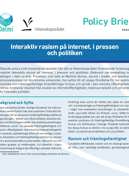The policy brief is about how perceived threats are related to xenophobia and so-called affective polarization, which can be described as increased psychological distance and tensions between different social groups or political parties. The outset is that perceived threats can increase both xenophobia and affective polarization. To find out whether people who are more likely to perceive threats between groups tend to be more xenophobic, a series of regression analyses were performed with different indicators of xenophobia as outcome variables.
Some conclusions:
- Immigration is often formulated as a threat, for example by right-wing populist parties, but not all people are affected by such statements. People with a so-called right-wing authoritarian personality are particularly sensitive to perceived threats from other groups and are also more xenophobic.
- People who perceive increased refugee immigration as a threat are more “affectively polarized”, meaning that they are more likely to hold preconceived, negative opinions and feelings about other political parties or their supporters. Xenophobia can thus lead to tensions between different parties and groups in society.
The authors of this policy brief are Emma A. Renström, Associate Professor of Psychology at the University of Gothenburg, and Hanna Bäck, Professor of Political Science at Lund University.
The policy brief is only available in Swedish. Please contact Delmi if you are interested in finding out more.
Picture by Markus Spiske from Unsplash.

